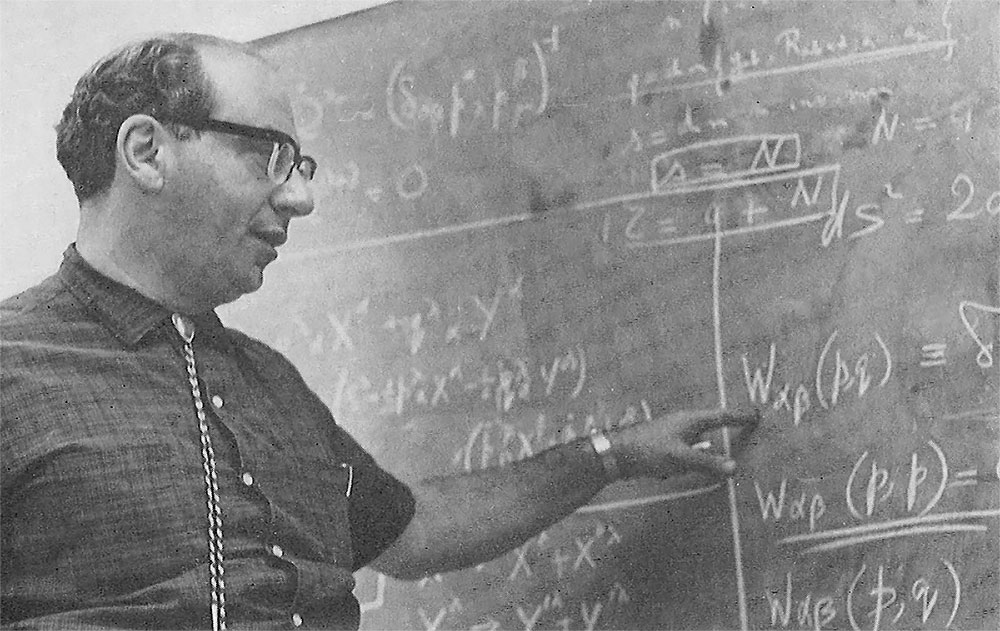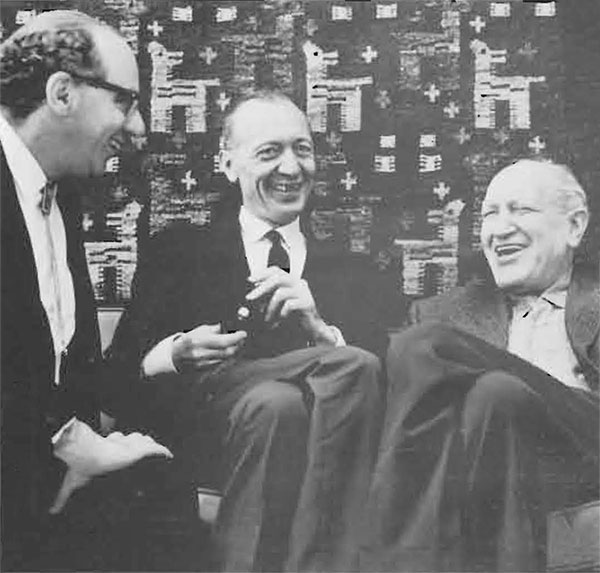
Ivor Robinson was a professor and founding head of the Division of Mathematics and Mathematical Physics at the Graduate Research Center of the Southwest, which in 1969 became UT Dallas.
UT Dallas professor emeritus Ivor Robinson, an eminent mathematical physicist noted for his contributions to the development of Albert Einstein’s general theory of relativity, died May 27 at his home in Dallas. He was 92.
Robinson was a founding member of the faculty recruited in 1963 to the Graduate Research Center of the Southwest (GRCSW), the private research organization that in 1969 became The University of Texas at Dallas.
As professor and founding head of the GRCSW’s Division of Mathematics and Mathematical Physics, Robinson recruited distinguished experts in the fields of mathematics, relativity theory and cosmology to join him at the fledgling research institute. These faculty members subsequently formed the cores of the mathematical sciences and physics departments in the School of Natural Sciences and Mathematics when UT Dallas was created.
In a 2012 interview, Robinson recalled that his faculty recruitment efforts were successful despite the then-remoteness of the North Texas region.
“I recruited relativity researchers of considerable promise by looking for them abroad,” Robinson said. “In America, promising young physicists largely regarded American civilization as consisting of two coastal regions with a rather large desert area in between.”
Among those who joined Robinson as permanent faculty at the GRCSW were Dr. Istvan Ozsváth, a former professor of mathematics who died in 2013, and Dr. Wolfgang Rindler, professor emeritus of physics. The three colleagues — and good friends — spent the remainder of their research and teaching careers at UT Dallas.
“Ivor Robinson made a powerful impression on all with whom he interacted, through his intellectual prowess, his distinctive personality and presence, and by his unchallenged role in defining the standards expected of UT Dallas faculty.”
Dr. Hobson Wildenthal,
UT Dallas president ad interim
“Ivor was charged with the formation of a mathematical physics group concentrating on general relativity and cosmology,” Rindler said. “His faculty comprised both resident and itinerant scholars from all over the world, concentrating particularly on relativistic astrophysics.”
Robinson was one of four organizers of the first international scientific conference that highlighted new research in the combined fields of relativity and astrophysics, focusing on the then-newly discovered astronomical objects called quasars. He named the new scientific discipline “relativistic astrophysics” in part to attract conference attendees from around the globe to Dallas. Held in December 1963, that first Texas Symposium on Relativistic Astrophysics, as it came to be called, was so successful that it has since been held about every two years at sites around the world, retaining the name Texas Symposium regardless of location.
“Above all, Ivor was a brilliant and renowned mathematical relativist, whose work among other things was one of the cornerstones of modern twistor theory, a huge mathematical framework developed by Sir Roger Penrose for the discussion of relativity and quantum mechanics,” Rindler said.
“Ivor was an incredibly cultured and well-read man, with interests in politics, history and Israel — when he was not deeply involved in his research,” Rindler said. “No one who knew him will forget what a brilliant conversationalist he was, with his sonorous deep voice and ultra-English accent, with his convictions and occasional mischievousness. But he was also a kind man whom many will mourn as a loyal friend or as a fatherly mentor.”
Dr. Zsuzsanna Ozsváth, the Leah and Paul Lewis Professor of Holocaust Studies at UT Dallas, and her husband, Istvan, whom friends called Pista, knew Robinson for more than half a century.

In the 1960s, Robinson, with visiting professors Dr. Andre Lichnerowicz (center) and Dr. Leopold Infeld, recruited distinguished experts in mathematics, relativity theory and cosmology to the institute.
“I had lived through the Holocaust as a child, during which all of my parents’ brothers and sisters, and all of my cousins and all of my little childhood friends were killed,” she said. “Pista and I left Hungary in 1957, after the Hungarian Revolution. This was a hard and difficult decision, but I felt that we must leave. Leaving behind our parents, our home, our friends and the country where we grew up was very difficult for us, especially since it became uncertain whether or not we’d ever see our parents and our friends again.
“Coming to Dallas and becoming Ivor’s friend were the first steps toward our finding a home in this city,” Ozsváth said. “Indeed, being close to him meant feeling secure in the world for the first time in my life. In fact, Ivor became a friend who has not only cared about us and helped us at every step, but he made it possible that we learned everything about what to do and how to do things in a country that was still foreign to us.”
Ivor Robinson was born Oct. 7, 1923, in Liverpool, England. He earned a Bachelor of Arts degree in mathematics from Trinity College, Cambridge University, in 1947. Before arriving at the GRCSW in 1963, he held academic appointments as a research associate or lecturer at the University College of Wales, King’s College, London, the University of North Carolina, the University of Hamburg, Syracuse University and Cornell University. He retired from UT Dallas in 2000.
“Ivor Robinson made a powerful impression on all with whom he interacted, through his intellectual prowess, his distinctive personality and presence, and by his unchallenged role in defining the standards expected of UT Dallas faculty,” said Dr. Hobson Wildenthal, UT Dallas president ad interim. “As a product of the old British system, in which the PhD was considered a superfluous ‘German’ invention, Ivor’s highest degree was a Bachelor of Arts from Newton’s old college in Cambridge, Trinity College. It was always enjoyable to educate the accreditation bureaucrats, when they reviewed our faculty, that it was a mark of extra distinction for Ivor to have attained international renown without the bother of additional classwork.”
Robinson is survived by his wife, Joanna, as well as four children and seven grandchildren. He is buried in Israel.